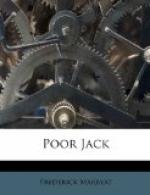I thanked old Nanny once more for having trusted me, and then we left her, I did keep my word with, her, and gave her good bargains for a long while afterward.
I often thought of my father, who had been absent now for nearly four years, and, as the time advanced, I became more anxious to hear of him. I seldom met old Ben the Whaler without talking about my father, and asking Ben what chance he thought there was of his return.
“Why, you see, Jack,” said Ben, “in these times it’s hard to say whether a man be alive or not. Every day we hear of some naval action or another, and therefore every day some must lose the number of their mess; and then you see, Jack, a man may be supposed to be dead for years, and after all turn up in some French prison or another; and then ships change their stations, and ships’ companies their ships; and then ships are sometimes wrecked, with all hands, or take fire, and are blown up. Many a good seaman loses his life by falling overboard in a gale—and who knows or cares? Whether your father be alive or be dead, Jack, it is impossible for me to say; but, howsomever, I hope he be.”
This was not a satisfactory, although a cautious reply, and I never could get Ben to give any other. I began to think that one of the mischances enumerated in Ben’s catalogue might have occurred, and that I never should see my father again, when one morning, as I was standing at the landing-place, Ben came up to me and said, “Now, Jack, perhaps we may hear something of your father. Here’s been a famous action fought, and a matter of a thousand men killed and wounded. I’ve only just heard about it. Nelson has licked the French on the coast of Egypt” (Ben here referred to the battle of the Nile), “and the ‘Oudacious,’ the ship on board of which your father was boatswain’s mate, was in the action. Now, you see, the names of the killed will be sent into the office here, that their relations may receive the pay and prize-money due to them. So now, Jack, perhaps you’ll hear something about your father.”
“But I shall only hear of his being killed, by your account. I don’t want to hear that.”
“No, boy, of course you don’t; but if you do, you’ll hear the worst of it, and that’s some comfort, and if he aren’t killed, why, perhaps he’s wounded, and perhaps he aren’t; all perhapses in this world. Howsomever, come with me. I saw Anderson, with a paper in his hand, walking up to his retreat, as he calls it; so let’s make all sail after him, and we shall overhaul him before he begins to read it.”
[Illustration: ANDERSON READING THE NEWS OF THE BATTLE OF THE NILE.—Marryat, Vol. X., p. 115.]




